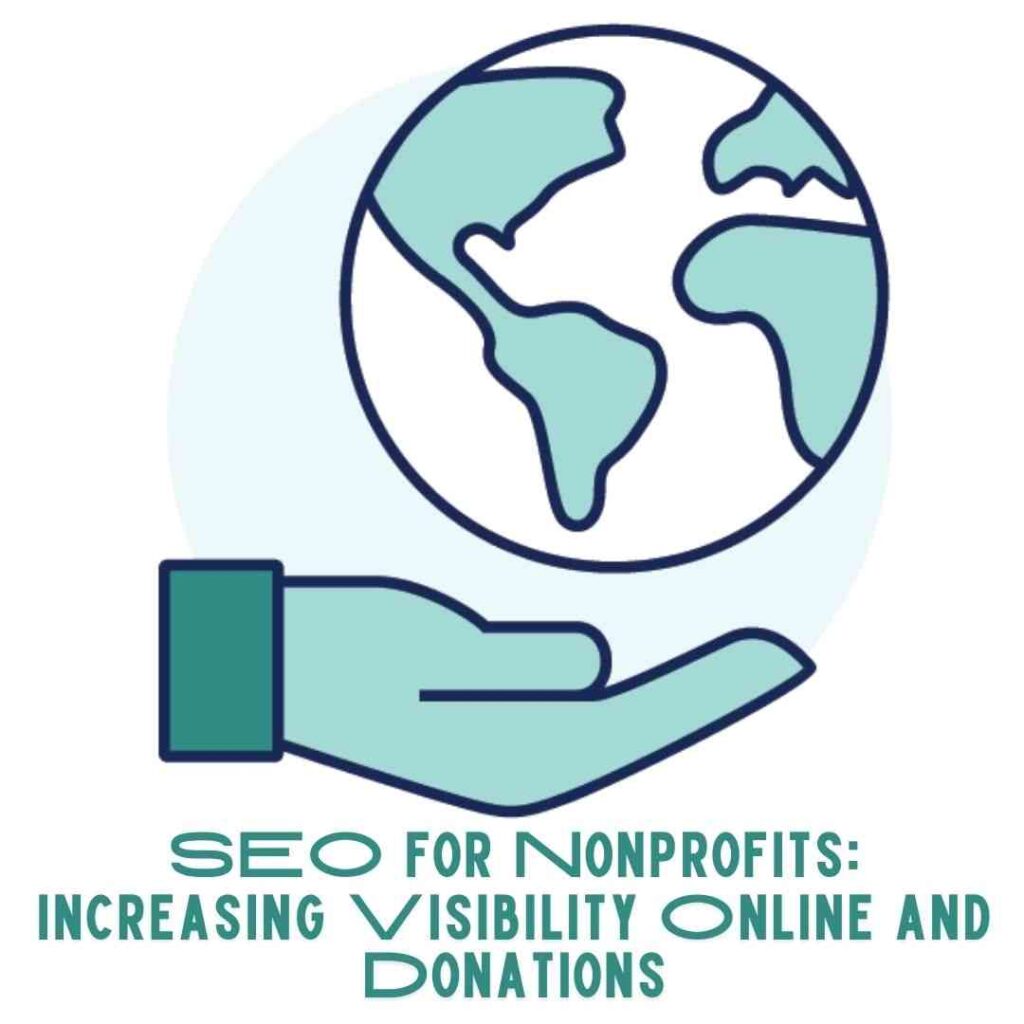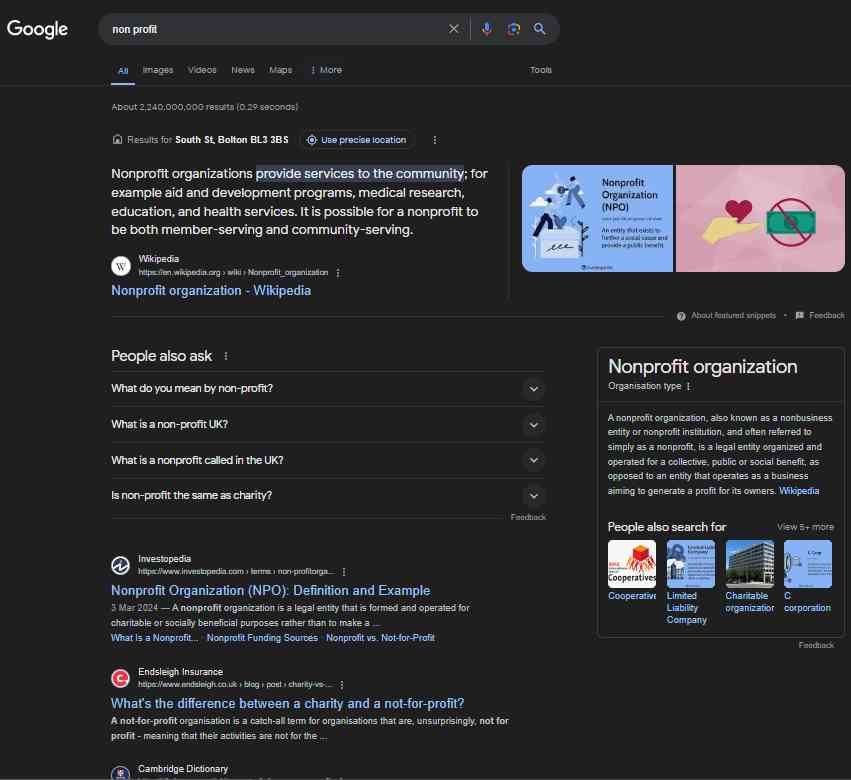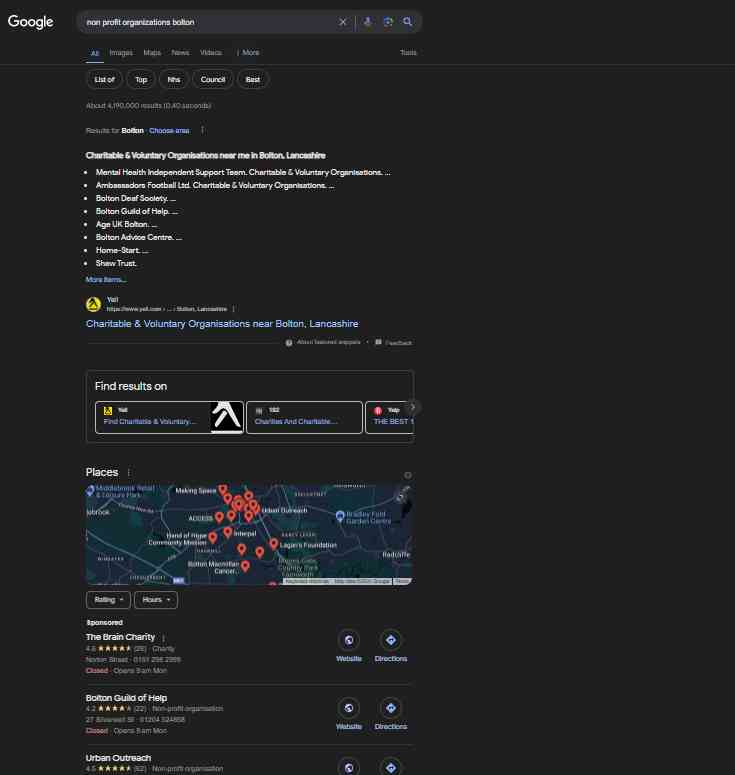
What is Nonprofit Organizations
Nonprofit organizations are essential in tackling issues related to society, culture, and the environment. They also make a substantial contribution to the welfare of communities worldwide. Organizations that function for reasons other than earning a profit are known as nonprofit organizations. Rather, they work for socially beneficial objectives including humanitarian, scientific, educational, religious, or charitable missions.
There are many different types of nonprofits, such as advocacy organizations, foundations, charities, and social enterprises. Rather than making money for the owners or shareholders, they depend on grants, donations, and other sources of income. Depending on the nation and the nature of their particular operations, nonprofits are subject to different regulations and are frequently run by a board of directors.
Digital Marketing for NonProfit Organizations
Every nonprofit organization should always endeavor to increase its online visibility through digital channels. This is a more effective and measurable way of letting people know what course the organization stands for. Several digital channels can be used to communicate marketing messages to prospective donors or organizations willing to help whatever cause the organization stands for. My favorite channels for reaching potential donors and increasing online donations will be both SEO and LinkedIn.
One of the most important factors to consider when selecting a marketing channel is the kind of audience and what the audience favors. In this article, the focus will be on SEO as a channel for getting donors.
Download Checklist
The Importance of SEO strategies for nonprofits.

SEO Increases Online Reach and Visibility
To draw in sponsors, volunteers, and supporters, nonprofits need to be well-known. By increasing the organization’s exposure in search engine results pages (SERPs), SEO helps consumers find them more easily when they’re looking for pertinent terms or phrases associated with their mission or activities.
Expense-effectiveness
When compared to more conventional marketing strategies, SEO can help NGOs reach their target demographic at a lower cost. Nonprofits don’t need to spend a lot of money on paid advertising to get organic traffic by optimizing their website and content for search engines.
Brand Awareness and Credibility
When you optimize your website, it signals credibility and authority to users. Nonprofits that appear at the top of SERPs for relevant keywords are more likely to be perceived as trustworthy and legitimate organizations, which can boost their brand awareness and reputation.
Targeted Marketing
SEO allows nonprofits to target specific keywords and phrases that are relevant to their cause or audience. By understanding the search behavior of their target audience, nonprofits can tailor their SEO efforts to reach those who are most likely to support their mission.
Measurable Results
SEO performance can be tracked and measured using various analytics tools, allowing nonprofits to assess the effectiveness of their strategies and make data-driven decisions for optimization. This helps in identifying areas of improvement and refining the SEO approach over time.
Competitive Advantage
In today’s digital age, having a strong online presence is essential for nonprofits to stay competitive. Organizations that invest in SEO and rank higher in search results gain a competitive advantage over those that do not prioritize their online visibility.
Understanding Nonprofit Search Engine Optimization Challenges

The majority of nonprofit organizations face difficulties in executing SEO strategies due to some reasons that will be discussed below.
Competition for Visibility
When it comes to visibility in search, nonprofits frequently face competition from a wide range of other groups. This can be particularly difficult in congested areas or for well-liked keywords associated with shared causes, as the rankings may be dominated by bigger, more reputable businesses.
Restricted Funds
Since many NGOs have limited funding, it’s possible that they can’t afford to invest in SEO tools or expertise. Due to this, competing with larger companies or for-profit companies that have specialized marketing teams or agencies may be difficult.
Complexity of Messaging
Since nonprofit organizations frequently address complicated and multidimensional topics, it can be difficult to produce material that is readable by humans. It takes careful planning and strategy to strike a balance between the requirement to communicate their effect and mission and SEO best practices.
Limited Technical Expertise
SEO encompasses technical elements that call for certain knowledge and abilities, such as link building, keyword research, and website optimization. Nonprofits often do not have internal experts in these fields, therefore it might be challenging for them to apply SEO tactics that work without outside help.
Download Checklist
Addressing Challenges of SEO for Nonprofits Organizations
Taking on the unique SEO issues that nonprofit organizations confront necessitates a planned approach and a combination of methods geared to their specific requirements and resources. Here are some ways non-profits can address these challenges:
Effective SEO Involves Clear Priorities and Goals
Establish precise SEO objectives that are in line with the goals and mission of the company. Give top priority to initiatives that can benefit most from increased visibility, such as volunteer recruitment, fundraising, and raising public awareness of important topics.
SEO for Nonprofit involves using Resources Wisely
Nonprofits may not have a lot of money, but you may still have a big impact by using your time and energy well. Think about funding volunteer or staff training, making use of free or inexpensive SEO tools and resources, and requesting pro bono help from experts or organizations that are willing to promote your cause.
Prioritize effective SEO Strategies
SEO is a long-term endeavor with potentially delayed outcomes. Concentrate on developing a strong SEO foundation by streamlining the architecture of your website, producing content of the highest caliber, and gradually obtaining trustworthy backlinks. Achieving sustainable results requires perseverance and consistency which in the long term will increase the visibility of nonprofits online.
Put a Focus on Local SEO
Nonprofits frequently assist certain communities or regions. To improve exposure inside your target region, make use of local SEO tactics including location-based keyword optimization, claiming and improving your Google My Business page, and taking part in local events or partnerships.
Using Local SEO to Help Online Presence of Nonprofit Organizations

Local SEO techniques can help community-based NGOs become more visible and engage with the people in their target area. These companies can employ the following particular strategies:
Enhance your listing on Google My Business (GMB)
Make sure your company’s Google My Business listing is claimed and optimized to guarantee that correct information appears in local search results. Include any pertinent information, including your address, phone number, website URL, operating hours, and categories that relate to your offerings.
Optimization of Local Keywords
To find terms and phrases that members of your neighborhood are likely to use when looking for nonprofits or services similar to yours, conduct keyword research. To increase your chances of ranking for local searches, naturally include these keywords in the text, meta tags, and headings of your website.
Produce Localized Content to leverage SEO
Write material that addresses the issues, passions, and happenings unique to your neighborhood. Articles, blog entries, announcements of events, and success stories catered to regional audiences could all fall under this category. To accentuate your connections to the community, highlight your collaborations with nearby companies, civic leaders, and other groups.
Create Local Citations and Backlinks
Verify that your company is regularly and accurately featured in internet directories, community websites, and local business listings. In local search results, these citations support the establishment of your authority and reliability. Look for chances to get backlinks from respectable regional websites, including government portals, community blogs, and news organizations.
Promote Local Testimonials and Reviews
Invite pleased customers, volunteers, and people of the community to post gratifying reviews and testimonials on websites such as Facebook, Yelp, and Google. Not only can positive reviews increase your trustworthiness, but they also make you more visible in local search results.
Participate in Local Community Events and Projects to increase donations
Take part in neighborhood gatherings, celebrations, and neighborhood projects to build your organization’s reputation and relationships in the neighborhood. Organize social gatherings, service days, or fundraising activities that highlight your cause and unite people.
Assessing Nonprofit SEO Performance

Tracking multiple metrics to evaluate the impact on visibility, engagement, and conversions is necessary to evaluate the effectiveness of SEO activities for charitable organizations. Some important indicators and techniques for gauging nonprofit SEO success are as follows:
Organic Website Traffic
Keep an eye on the total amount of search engine-generated organic traffic coming to your website. Examine patterns over time to determine spikes or dips in traffic, then connect them to search engine optimization campaigns and algorithm changes.
Keyword Analysis
Monitor the positions of target keywords that are associated with the services, location, and goals of your nonprofit. Use SEO tools to track keyword placements and spot areas for improvement, such as Moz, SEMrush, and Google Search Console.
Click-Through Rate
Find out how successfully your titles and meta descriptions are drawing clicks from search engine users by tracking the click-through rate for organic search results. A greater CTR suggests that your listings are interesting and pertinent to the queries of searchers.
Conversion Rate
Monitor the conversion rate of your website by keeping track of actions like donations, volunteer sign-ups, email newsletter subscriptions, and event registrations. To determine whether SEO is successful in influencing desired behaviors, compare the conversion rate of organic traffic to that of other channels.
Quality of Backlinks
Track the number and caliber of backlinks that other domains are using to point to your website by checking your backlink profile. Over time, the authority and search engine rankings of your website might be enhanced by earned backlinks from reliable sites.
Local SEO
Track metrics relevant to local search, such as impressions, clicks, and actions performed from Google My Business listings, as well as local citation consistency and visibility in local directories, for community-based NGOs.
Return on Investment
Determine the ROI of your SEO efforts by weighing the value produced—such as more donations, volunteer hours, or event attendance—against the cost of implementation. To evaluate the effectiveness of your SEO strategies, find the cost per acquisition (CPA) for the intended activities.
Conclusion
Since SEO increases a nonprofit’s internet presence and facilitates supporters’ finding of them, it is essential for nonprofits. By making website material more optimized, it provides an affordable means to increase visibility and attract specific donors. Nonprofits can connect with people who are likely to support their cause by focusing on particular keywords. Higher search engine ranks build brand credibility and raise the possibility of drawing in volunteers and money. Nonprofits can make well-informed decisions and obtain a competitive advantage in the digital space by implementing data-driven SEO tactics.

